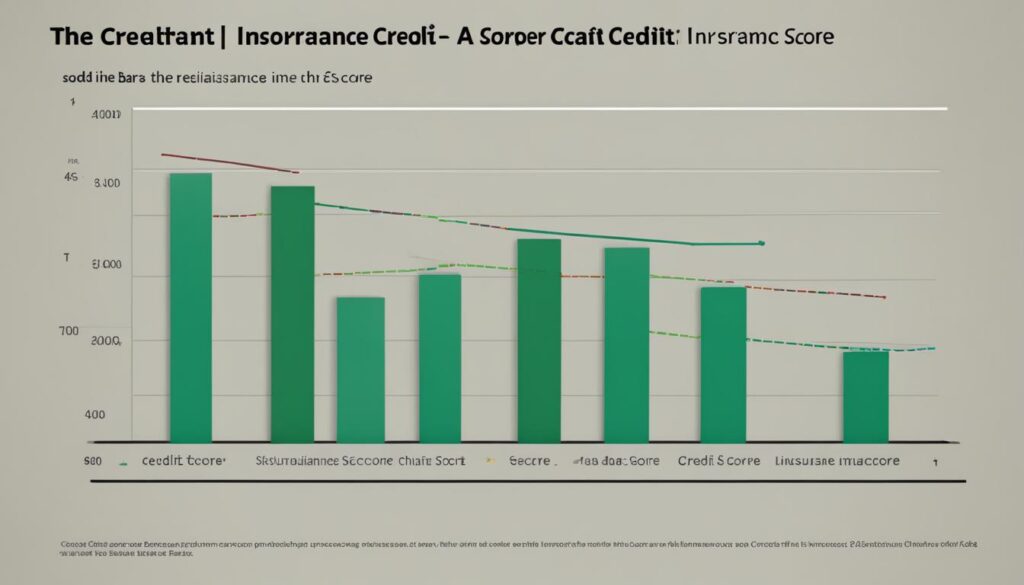Insurance companies in the United States take various factors into account when determining insurance quotes and premiums. One of these factors is your credit score. Yes, you read that right, your credit score can influence the cost of your insurance coverage.
The use of credit-based insurance scores by insurers has become a common practice. These scores are derived from data in your credit report and are used to assess your insurance risk level. Payment history, credit history length, and other factors affecting your credit score are considered when calculating your insurance score.
Research has shown that credit-based insurance scores are effective in predicting the potential for insurance losses. Individuals with higher credit scores tend to have fewer accidents and file fewer claims, resulting in lower costs for insurance companies. However, it’s important to note that credit scores are just one of the factors insurers consider when determining your insurance rates. Your driving history and claims history also play significant roles.
Key Takeaways:
- Your credit score can impact the cost of your insurance premiums.
- Insurance companies use credit-based insurance scores to assess insurance risk.
- Factors such as payment history and credit history length are considered in determining your insurance score.
- Higher credit scores are associated with lower insurance costs.
- Driving history and claims history also influence insurance rates.
How Credit Scores Impact Insurance Premiums
While credit scores themselves do not directly impact insurance premiums, your overall credit history plays a significant role in determining insurance rates and eligibility. Insurance companies use credit history to calculate an insurance score, which helps assess the likelihood of filing claims and the level of risk an individual poses. Individuals with better credit scores and a history of responsible financial management typically qualify for lower insurance premiums.
On the other hand, individuals with poor credit scores may face higher insurance rates or may even be denied coverage. Insurance companies perceive individuals with lower credit scores as higher risk, as their credit history suggests a greater likelihood of filing claims. This can result in higher premiums or limited insurance coverage options.
Improving your credit score is essential for securing better insurance rates and increasing your eligibility for insurance coverage. Here are some tips to help you improve your credit score:
- Maintain a Good Payment History: Pay your bills on time and avoid late payments or defaults. Consistently meeting your financial obligations demonstrates responsible financial management, reflecting positively on your credit score and insurance eligibility.
- Reduce Debt: Reducing your overall debt and keeping credit card balances low can help improve your credit score. Insurance companies perceive individuals with lower debt levels as less financially burdened and potentially lower risk.
- Dispute Inaccuracies: Regularly review your credit report for errors and dispute any inaccuracies. Inaccurate information can negatively impact your credit score, leading to higher insurance rates.
By following these steps, you can work towards improving your credit score and potentially enjoy better insurance rates and coverage options. Remember, maintaining responsible financial habits is crucial for long-term financial well-being and insurance affordability.
Understanding Credit-Based Insurance Scores
Credit-based insurance scores play a crucial role in determining eligibility for payment plans and insurance rates. These scores are used by insurance companies alongside factors like driving history and claims history to assess insurance risk for individuals. Unlike traditional credit scores that focus on loan repayment likelihood, credit-based insurance scores predict insurance loss potential.
Insurance companies consider various factors when calculating credit-based insurance scores. These factors include payment history, credit history length, and the likelihood of filing claims. By analyzing these factors, insurers can assess an individual’s insurance risk and determine the appropriate rates and coverage options.
Individuals with a good insurance score, combined with a clean driving history and no claims, typically qualify for lower insurance rates. On the other hand, individuals with excellent insurance scores but a poor driving history may be considered riskier to insure, which could result in higher premiums.
To illustrate the impact of credit-based insurance scores, let’s take a look at an example:
| Insurance Score | Driving History | Insurance Premiums |
|---|---|---|
| Good | Clean | Low |
| Excellent | Poor | High |
As you can see from the table above, individuals with good insurance scores and a clean driving history are likely to enjoy lower insurance premiums. On the other hand, those with excellent insurance scores but a poor driving history may face higher premiums due to the increased risk associated with their driving behavior. This demonstrates the importance of maintaining both a good insurance score and a clean driving record to secure favorable auto insurance rates.
Credit-Based Insurance Scores and the Use of Credit
Insurance companies utilize credit-based insurance scores as a way to assess the likelihood of individuals filing insurance claims. These scores are derived from information in credit reports, giving weight to factors such as payment history and credit history length. While insurance companies do not directly use credit scores, they do have an impact on the insurance score.
Insurance coverage based on credit score:
Credit-based insurance scores play a significant role in influencing insurance quotes and coverage. Insurers use these scores to estimate the risk associated with providing coverage to an individual. Factors like payment history and credit utilization are indicative of an individual’s financial responsibility and their potential for filing claims. Based on these scores, insurance companies may offer lower coverage or even deny coverage to individuals with poor credit scores.
Insurance quotes and credit score:
Insurance quotes are influenced by credit scores, which indirectly affect the insurance score. A low credit score can result in higher insurance quotes as it suggests a higher likelihood of filing claims and represents a greater risk to the insurance company. Conversely, individuals with higher credit scores may be eligible for lower insurance quotes as they are seen as more responsible and less likely to file claims.
Insurance score vs credit score:
Although insurance score and credit score share a relationship, they are not the same. Insurance companies consider various factors, including credit scores, driving history, claims history, and property value, to determine insurance rates. While a credit score may indicate an individual’s general financial responsibility, the insurance score focuses specifically on the risk associated with insurance claims. Therefore, it is possible for an individual to have a good credit score but a poor insurance score if they have a history of claims or accidents.
| Insurance Score Factors | Credit Score Factors |
|---|---|
| Payment history | Payment history |
| Credit history length | Credit history length |
| Claims history | Credit utilization |
| Driving history | Types of credit |
| Property value | Number of inquiries |
Credit-based insurance scores provide insurers with valuable insights into an individual’s risk potential. However, it’s important to note that credit scores are not the sole determinant of insurance rates. Other factors such as driving history, claims history, and property value also play crucial roles in the assessment process. Some states have regulations in place that restrict or prohibit the use of credit in insurance pricing.

How Does Understanding Key Credit Score Factors Impact Insurance Premiums?
Understanding credit score factors is crucial in determining insurance premiums. Insurance companies use credit scores to assess the risk of policyholders. Factors such as payment history, credit utilization, and credit history greatly impact the cost of insurance. Being aware of these factors can help individuals make informed financial decisions and potentially lower their insurance premiums.
Conclusion
In conclusion, the impact of credit scores on insurance premiums is primarily seen through the use of credit-based insurance scores by insurance companies. These scores, along with other factors, are used to assess an individual’s risk and determine their eligibility for payment plans and insurance rates. While credit scores themselves do not directly influence insurance premiums, a poor credit history can lead to higher rates or even denial of coverage.
Improving your credit score through responsible financial management can play a key role in securing better insurance rates. By maintaining a good payment history, keeping debt levels low, and disputing any inaccuracies in your credit report, you can demonstrate financial responsibility to insurers. This can result in lower insurance premiums and greater access to insurance coverage.
When evaluating insurance options, it’s important to consider not only your credit score but also other factors such as driving history and claims history. Insurance companies take into account various risk factors when determining rates, making it beneficial to maintain a clean driving record and minimize the number of claims filed.
In summary, while credit scores indirectly influence insurance rates through credit-based insurance scores, responsible financial management and maintaining a good credit history are key to securing favorable insurance premiums. By understanding the relationship between credit score and insurance premiums, individuals can take proactive steps to improve their credit standing and access more affordable insurance coverage.
FAQ
How does your credit score impact your insurance premiums?
Your credit score indirectly impacts your insurance premiums through credit-based insurance scores. Insurance companies use these scores, along with other factors, to assess risk and determine eligibility for payment plans and insurance rates.
What is the best credit score for insurance?
While there is no specific credit score required for insurance, individuals with better credit scores and a history of responsible financial management typically qualify for lower insurance premiums. Improving your credit score can help secure better insurance rates.
Can I get insurance coverage if I have a low credit score?
Yes, insurance coverage is still available for individuals with low credit scores. However, individuals with poor credit scores may face higher insurance rates or may even be denied coverage.
How can I improve my credit score for better insurance rates?
You can improve your credit score by maintaining a good payment history, reducing debt, and disputing any inaccuracies in your credit report. Taking these steps can help secure better insurance rates.
What factors affect my credit score and insurance premiums?
Factors such as payment history, credit history length, and the likelihood of filing claims are considered in calculating credit-based insurance scores. Other factors such as driving history, claims history, and the value of your home or car also play a role in determining insurance premiums.
Are there insurance policies available for individuals with a bad credit score?
Yes, there are insurance policies available for individuals with a bad credit score. However, these individuals may face higher insurance rates due to the increased risk they pose to insurers.
Are credit-based insurance scores different from traditional credit scores?
Yes, credit-based insurance scores are different from traditional credit scores. While traditional credit scores focus on loan repayment likelihood, credit-based insurance scores focus on predicting insurance loss potential.
How do insurance companies use credit scores?
Insurance companies use credit scores as part of their calculation of credit-based insurance scores. These scores help determine insurance quotes and premiums by assessing the likelihood of filing claims.
What is the difference between insurance scores and credit scores?
Insurance scores are used to assess insurance risk, while credit scores are used to determine loan repayment likelihood. Insurance scores focus on factors such as payment history, credit history length, and the likelihood of filing claims, while credit scores consider various factors related to financial responsibility.

